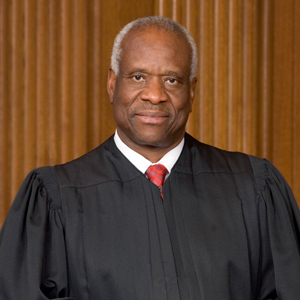Afternoon Briefs: Justice Thomas speaks in SCOTUS teleconference arguments; courts want rule ideas

U.S. Supreme Court Justice Clarence Thomas.
Few glitches and 1 surprise in SCOTUS teleconference arguments
U.S. Supreme Court Justice Clarence Thomas asked questions during the high court’s first teleconference arguments Monday, something he rarely does. The court followed a new format in which Chief Justice John G. Roberts Jr. asked the first question, then other justices talk in order of seniority. Few problems occurred. At one point, Justice Sonia Sotomayor forgot to unmute her audio. At another, there was a problem with Justice Stephen G. Breyer’s audio quality. Thomas last asked questions in March 2019. At issue in the case being argued was whether a generic word can be given trademark protection when it is part of a “.com” domain name. (Law360, Law.com, the Washington Post)
Following COVID-19 pandemic, federal courts system wants ideas for rules
Rules committees with the Administrative Office of the U.S. Courts are seeking suggestions for possible amendments, which could make operations easier when the next national emergency hits. “The committees are particularly interested in hearing about situations that could not be addressed through the existing rules or in which the rules themselves interfered with practical solutions,” according to a press release. Suggestions should be sent to [email protected] by June 1. (Administrative Office of the U.S. Courts press release)
Third lender lawsuit is filed against Pierce Bainbridge
A third lawsuit has been filed against Pierce Bainbridge for alleged nonpayment of a loan, bringing the total sought by three different lenders to more than $500,000. This time, the plaintiff is Creative Capital Funding. Pierce Bainbridge founder John Pierce told Law360 that Pierce Bainbridge was “liquidity-strapped” after dealing with “expensive uninsured medical expenses for a family member in a life or death situation.” The firm is “leaner and meaner,” he said, and new cases are coming in the door. Pierce has previously denied a report that the firm is winding down. (Law360)
Davis Polk seeks partial dismissal of bias claims
Davis Polk & Wardwell is seeking to dismiss some racial bias claims in a lawsuit filed by former associate Kaloma Cardwell. The law firm is seeking dismissal of claims against six of eight partners on the grounds that their actions didn’t result in any adverse employment action and didn’t show discriminatory animus. The firm also wants to toss some claims on the basis that they were filed too late. In any event, the law firm says, Cardwell’s hostile work environment claim should be dismissed because it doesn’t allege enough facts to support it. Cardwell’s suit had alleged that Davis Polk fired him because he complained about racial bias. The firm claims that the firing was due to “deficient performance.” (The New York Law Journal, Law360, Davis Polk memorandum)
7th Circuit rules against Molson Coors in Super Bowl beer advertising suit
The 7th U.S. Circuit Court of Appeals at Chicago said Friday that Molson Coors is not entitled to an injunction in its lawsuit accusing Anheuser-Busch of false advertising. The suit attacked Bud Light ads that aired during the Super Bowl, which highlighted the use of corn syrup by Miller Lite and Coors Light. Molson Coors said corn syrup is used as a fermentation aid, but it doesn’t end up in the finished product. The 7th Circuit noted that Molson Coors lists corn syrup as an “ingredient” in the beers and said the company brought the problem on itself. “If Molson Coors does not like the sneering tone of Anheuser-Busch’s ads, it can mock Bud Light in return. Litigation should not be a substitute for competition in the market,” the 7th Circuit said. (Law360, Crain’s Chicago Business, Bloomberg Law, the 7th Circuit opinion)



